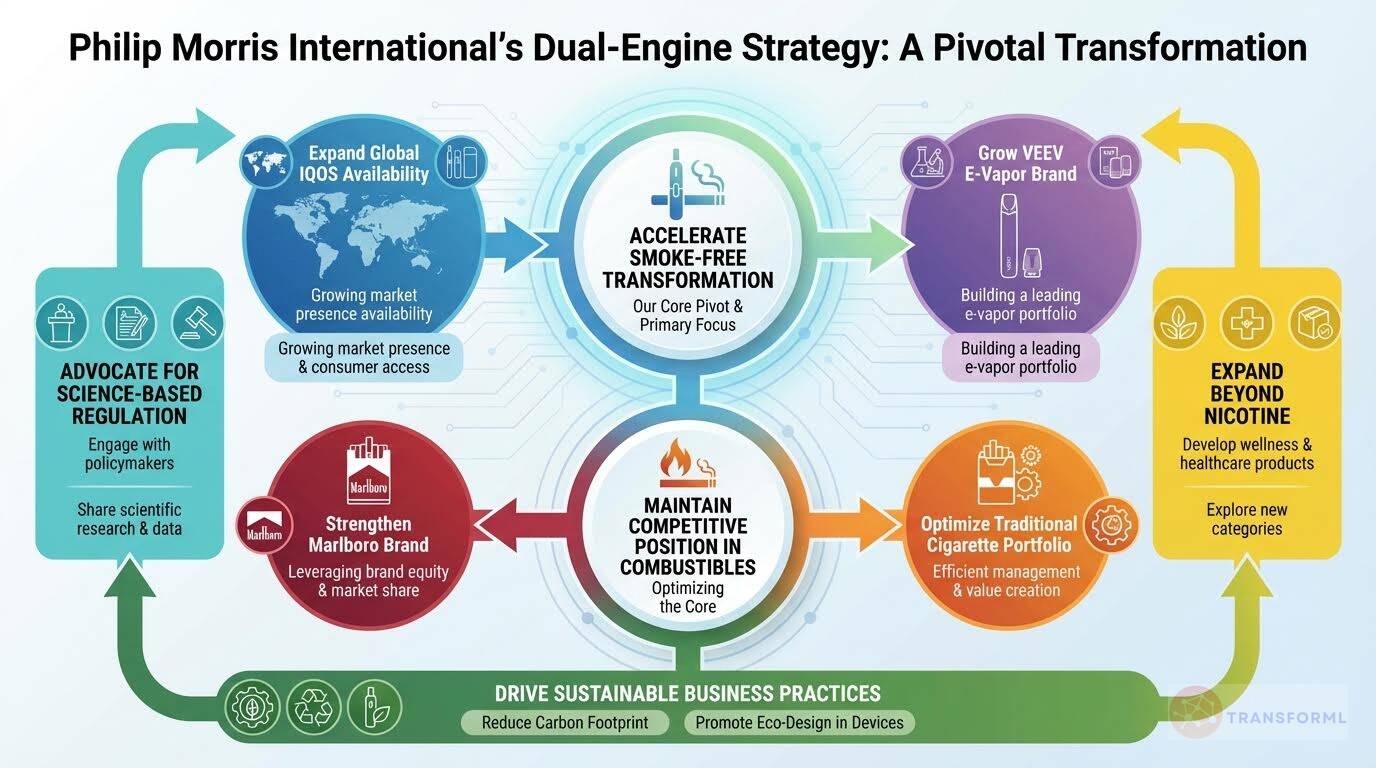Philip Morris International Inc. Strategy Analysis

Editor-reviewed by Ahmad Zaidi based on analysis by TransforML's proprietary AI
CEO, TransforML Platforms Inc. | Former Partner, McKinsey & Company
Strategy overview for Philip Morris International Inc.
Philip Morris International (PMI) is undergoing a strategic transformation, shifting from traditional combustible tobacco products to smoke-free alternatives. In 2024, PMI demonstrated strong financial performance driven by growth in both its smoke-free and combustible tobacco segments, with a focus on innovation and harm reduction. The company is actively investing in and expanding its smoke-free product portfolio, aiming to lead the industry towards a smoke-free future.

Key Competitors for Philip Morris International Inc.
Altria Group, Inc.
Strong presence in the U.S. market, established distribution network
British American Tobacco plc
Global brand portfolio, diversified product offerings
Japan Tobacco Inc.
Strong presence in the Asian market, innovative product development
Imperial Brands plc
Focus on cost efficiency, established brand portfolio
Insights from Philip Morris International Inc.'s strategy and competitive advantages
What Stands Out in Philip Morris International Inc. strategy
Philip Morris International's strategy is uniquely defined by its fundamental business model transformation, a revolutionary pivot that sets it apart from the evolutionary strategies of its consumer staples peers. While competitors like PepsiCo aim to 'Evolve our portfolio' by shifting towards healthier options and P&G focuses on 'Irresistible Superiority' to optimize its existing model, PMI's core objective is to 'Accelerate Smoke-Free Transformation'—actively replacing its historical, profitable combustible business with a new category. This is not just a portfolio shift; it is an existential redefinition of the company.
A second key distinction is the centrality of regulatory and scientific advocacy to its success. For PMI, the strategic pillar 'Advocate for Science-Based Regulation' is a critical enabler for its entire 'How to Win' framework. In contrast, while PepsiCo and P&G navigate regulations, their core success is not as existentially dependent on fundamentally reshaping regulatory frameworks.
Finally, PMI's ambition to 'Expand Beyond Nicotine' into wellness and healthcare represents a more radical and high-risk diversification effort than the adjacent market expansions seen at PepsiCo or the deep category focus at P&G, signaling a long-term vision to transcend its current industry entirely.
What are the challenges facing Philip Morris International Inc. to achieve their strategy
The primary challenge for Philip Morris International lies in the sheer execution complexity and inherent risk of its transformational strategy compared to the more stable, optimization-focused approaches of its peers. PMI is simultaneously managing a declining legacy business, aggressively scaling a new global technology-based product ecosystem (IQOS), and incubating a third venture in an unfamiliar sector (wellness), all while navigating intense public and regulatory scrutiny. This contrasts sharply with the focused operational excellence of Coca-Cola, which hones its 'Commercial Execution' and 'Supply Chain' in a defined territory, or P&G, which leverages decades of experience to 'Strengthen the Execution of Our Strategy' within established categories.
Furthermore, PMI faces a profound brand trust deficit. Its 'Winning Aspiration' of delivering a 'Smoke-Free Future' requires convincing regulators and consumers of its harm-reduction claims, a significant hurdle given its history. Competitors like PepsiCo with its 'pep+ (PepsiCo Positive)' initiative and P&G with its purpose to 'improve the lives of the world's consumers' build on a more conventional and less controversial brand foundation, making their sustainability and wellness messaging easier to land. This trust gap makes every step of PMI's transformation, from product launch to regulatory approval, significantly more challenging.
What Positions Philip Morris International Inc. to win
Strong Financial Performance
- PMI demonstrates robust financial results, including increased net revenues, operating income, and operating cash flow, indicating a solid financial foundation and growth trajectory.
Leading Smoke-Free Portfolio
- The company has a well-developed smoke-free product portfolio, including IQOS, VEEV, and ZYN, with a growing user base and increasing contribution to total net revenues.
Global Market Presence
- PMI has a significant presence in approximately 170 markets, with a strong market share in many of these regions, providing a diverse revenue base and growth opportunities.
Innovation and R&D Capabilities
- PMI has invested over $14 billion in developing, scientifically substantiating, and commercializing innovative smoke-free products, demonstrating a commitment to harm reduction and product development.
Strategic Acquisitions and Partnerships
- The acquisition of Swedish Match AB and partnerships with companies like KT&G have expanded PMI's product portfolio and market reach, enhancing its competitive position.
Commitment to Sustainability
- PMI is focused on sustainability, with executive compensation linked to sustainability performance and initiatives to reduce environmental impact and improve social responsibility.
Strong Brand Recognition
- PMI's brand portfolio includes Marlboro, the world's best-selling international cigarette, and IQOS and ZYN, leading brands in the smoke-free product category, providing a competitive advantage.
Science-Based Regulation Advocacy
- PMI actively advocates for science-based regulation of smoke-free products, working with regulators to increase category understanding and promote tobacco harm reduction.
What's the winning aspiration for Philip Morris International Inc. strategy
Philip Morris International aspires to lead the global transition from traditional cigarettes to smoke-free products, aiming to improve public health by reducing harm and securing long-term sustainable growth for the company and its shareholders.
Company Vision Statement:
Delivering a Smoke-Free Future - PMI's transformation clearly demonstrates that there is an unprecedented opportunity for smoke-free products to sustainably accelerate our financial results and generously reward shareholders.
Where Philip Morris International Inc. Plays Strategically
Philip Morris International strategically focuses on international markets, excluding the U.S. and China, with a growing emphasis on smoke-free product availability in key regions. The company targets adult smokers and nicotine users, leveraging diverse distribution channels and expanding into the wellness and healthcare sector.
Key Strategic Areas:
How Philip Morris International Inc. tries to Win Strategically
Philip Morris International aims to win by leveraging its innovative smoke-free products, strong brand recognition, and commitment to scientific substantiation. The company focuses on product quality, marketing, and strategic partnerships to gain a competitive advantage and drive market share.
Key Competitive Advantages:
Strategy Cascade for Philip Morris International Inc.
Below is a strategy cascade for Philip Morris International Inc.'s strategy that has been formed through an outside-in analysis of publicly available data. Scroll down below the graphic to click on the arrows to expand each strategic pillar and see more details:
Related industry articles:
Accelerate Smoke-Free Transformation
Drive the business transformation away from combustible tobacco products through leadership in smoke-free products.
Expand IQOS ILUMA Availability
Increase the geographic reach of IQOS ILUMA by launching in new markets and expanding distribution in existing markets to reach more adult smokers.
Develop Innovative Heat-Not-Burn Alternatives
Invest in research and development to create a broader range of innovative and high-quality heat-not-burn alternatives across multiple price tiers to cater to diverse consumer preferences.
Enhance VEEV Market Position
Strengthen the market position of VEEV in key European markets and expand its availability to new regions, positioning it as a trusted choice among IQOS legal-age poly-users.
Optimize Smoke-Free Product Manufacturing
Optimize the manufacturing infrastructure for smoke-free products to increase production capacity and efficiency, ensuring sufficient supply to meet growing consumer demand.
Improve Smoke-Free Product Unit Economics
Improve the unit economics of smoke-free products through operating leverage, favorable pricing, and cost optimization initiatives to enhance profitability.
Maintain Competitive Position in Combustibles
Sustain a strong position in the combustible tobacco category while transitioning to smoke-free alternatives.
Optimize Combustible Tobacco Pricing
Implement strategic pricing adjustments for combustible tobacco products to maximize revenue and profitability while remaining competitive in the market.
Strengthen Marlboro Brand Resilience
Implement marketing and brand-building initiatives to maintain the resilience of the Marlboro brand, despite cannibalization from IQOS.
Optimize Cigarette Portfolio Mix
Optimize the cigarette portfolio mix by focusing on key international and local brands to maximize market share and profitability.
Improve Combustible Tobacco Cost Efficiency
Implement productivity and cost improvement initiatives in the manufacturing and supply chain of combustible tobacco products to mitigate inflationary pressures.
Advocate for Science-Based Regulation
Promote science-based regulation of smoke-free products to accelerate tobacco harm reduction.
Engage with Regulatory Bodies
Actively engage with regulatory bodies and policymakers to advocate for science-based regulation of smoke-free products, emphasizing tobacco harm reduction.
Expand Category Understanding
Increase category understanding among regulators and the public through education and communication initiatives, highlighting the differences between smoke-free products and cigarettes.
Promote Tobacco Harm Reduction
Promote tobacco harm reduction measures in countries where smoke-free products are banned, advocating for the availability of better alternatives to combustible cigarettes.
Support Science-Based Regulatory Frameworks
Support the development of science-based regulatory frameworks for the commercialization of smoke-free products, including the communication of scientifically substantiated information.
Share Scientific Research
Share scientific research and clinical data with regulators and the public to support the development of science-based regulatory frameworks for smoke-free products.
Cultivate an Engaged Organization
Build an engaged organization with distinctive capabilities and a winning team spirit.
Enhance Talent Development Programs
Enhance talent development programs to equip employees with the skills and knowledge needed to support the company's transformation and strategic goals.
Promote Diversity and Inclusion
Foster a diverse and inclusive work environment that reflects the demographics of the countries, communities, and consumers served.
Strengthen Succession Planning
Strengthen succession planning processes to ensure a robust pipeline of talent for key leadership positions.
Integrate Acquired Businesses
Successfully integrate acquired businesses, such as Swedish Match, by harnessing and retaining capabilities across both organizations.
Adapt PMI Culture
Adapt the PMI culture to serve the company's mission and the requirements of a modern and skillful workforce.
Drive Sustainable Business Practices
Integrate sustainability into all aspects of the business, including product sustainability and operational sustainability.
Reduce Carbon Footprint
Implement initiatives to reduce the company's carbon footprint across its operations, including manufacturing, transportation, and energy consumption.
Eliminate Child Labor
Strengthen efforts to eliminate systemic child labor in the tobacco supply chain and promote fair labor practices.
Promote Eco-Design Principles
Incorporate eco-design principles into the development of electronic devices to minimize environmental impact.
Prevent Deforestation
Implement measures to prevent deforestation in tobacco-growing regions and ensure sustainable sourcing of agricultural products.
Reduce Waste and Littering
Implement programs to reduce waste and prevent littering of cigarette butts and other tobacco products.
Expand Beyond Nicotine
Pursue long-term growth ambitions beyond nicotine in wellness and healthcare.
Develop Oral and Inhaled Offerings
Develop and commercialize oral and inhaled consumer health and wellness offerings, focusing on therapy areas such as pain management and cardiovascular emergencies.
Explore Cannabinoid Products
Research and explore the potential of medical and pharmaceutical cannabinoids, and non-recreational cannabinoid products (including CBD), in line with applicable regulatory requirements.
Establish Wellness and Healthcare Partnerships
Establish strategic partnerships with companies in the wellness and healthcare sectors to accelerate the development and commercialization of new products.
Optimize Wellness and Healthcare Portfolio
Optimize the wellness and healthcare portfolio by focusing on high-potential products and divesting non-core assets.
Read more about industry strategies
Source and Disclaimer: This analysis is based on analysis of Annual reports for 2024. For informational purposes only (not investment, legal, or professional advice). Provided 'as is' without warranties. Trademarks and company names belong to their respective owners.
